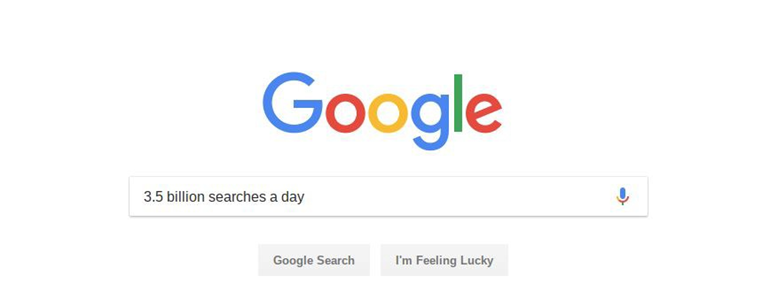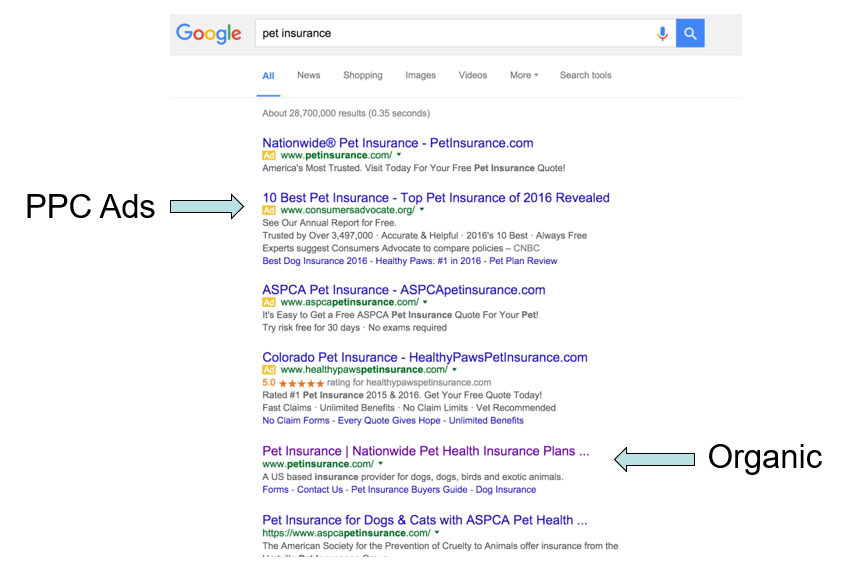SEO and PPC Confusion
What’s the difference between SEO and PPC?
After specializing in search marketing since 2008, this question comes up over and over again. Clients think they need just SEO or just PPC. Companies often tend to favor SEO because it’s cheaper to hire a good SEO company than pay for pay-per-click advertising. However, as powerful as hiring a solid SEO company can be, it’s no substitute for a high-level PPC strategy.
Furthermore, people often don’t really understand the difference between SEO and PPC. They think PPC is SEO and SEO is PPC. Is not search marketing just that: search marketing? Well, not really. The devil is in the digital details.
It’s not a question of either or. It’s both and. SEO and PPC are both fantastic tools to generate site traffic and revenue. Allow me to cover the landscape to clarify the difference between SEO and PPC.
SEO Defined
When you do a search on Google, or for that matter any other search engine such as Bing, AOL, or Yahoo, you get a blinking cursor. One enters a search phrase consisting of words or phrases. After entering your search phrase, you hit enter and boom! — what’s called a Search Engine Results Page (SERP) comes up.

When the SERP page comes up there are different sections to the page. In short, the results of your search presents you with click options. What you click on determines the next level of your search and where you end up. Hopefully, it’s a website that matches your intent, or what your looking for.

The image above shows the two categories of a search result: Paid and Organic. Organic clicks are free. Paid clicks cost money. Paid ads show on page one of the top four spots and bottom three spots on a desktop and the top three spots of mobile. Organic content shows in the middle of the search page.
Why Pay For Clicks If Organic Is Free?
So, the question becomes: If organic is free why bother clicking or paying for PPC, or pay-per-clicks ads? It’s a great question that requires a detailed answer on the SEO side first.
It depends on the keywords typed in that generated the search. For SEO, or organic search, it’s not easy to appear on the first page of Google. But, you say, I typed in X or Y keywords and my website shows on the first page. Well, you’re really not on the full search radar because you’re not appearing on the first page for all of your most important keywords. In organic, there’s lots of competition for keywords and it takes time, lots of time plus effort for your website to show on page one. X and Y keywords showed but what about A, B, C, D, E, F, G, H, I, J, and K keywords?
If your website does not show on page one of Google, 75% of searchers will not go to page two. And, it’s key you show on the top 30% of page one, especially for mobile devices or you won’t show at all. You have to show in the top of the fold, if at all possible. The top of the fold is the top 20 to 30% of the search page.
SEO Is Like Gardening
Organic SEO is like gardening. It takes time and lots of effort. You have to water, fertilize, and cultivate your website with the following, just to name a few:
- Relevant page content
- Lots of regular blog posts of at least 1,000 words or more
- Correct keyword structure on most pages
- A page load speed of at least 5 seconds
- A domain registered for five years or more
- A mobile friendly site
- Plus, about 200 other organic variables Google uses to rank a website’s strength.
As you can see, SEO is not easy. This is not to minimize the power of SEO. It’s one of the most important aspects of a good website. In fact, since you are busy running your business, one of the best things you can do is hire a professional SEO company to implement strong SEO best practices to your website. Let them do it for you. They usually charge a set monthly fee based on the number of keywords you wish to target. In addition, you will need a content strategy that depends on at least two relevant blog posts written for your site each month. The more the better. You have to rank for the top keywords in your category. Without a professional SEO company doing this for you, you will forfeit revenue and your long-term site authority and credibility.
Where Does PPC Fit In?
PPC is the other side of the search coin. PPC compliments SEO and they both work well together. In fact, without a dual SEO and PPC strategy, your limiting your website’s full revenue potential. You’re also leaving business on the table for your competition to grab.
What Is PPC?
With PPC, you bid on the keywords customers search for on Google, or other search engines to find your products or services. The right budget and keywords ensure your ads show. When someone clicks on your ad, you’re charged for that click. The person who clicks then lands on your website.
If your PPC account is managed and designed properly, ads show up for the right people, at the right place, and the right time.
As mentioned, the most effective PPC ads appear at the top of a search engine’s page. But that won’t happen without good account management. If your business doesn’t appear on the first page of Google, you won’t get a click. No click means no lead. No lead means no sale.
Paid Search Works Fast
PPC works quickly and generates relevant traffic to your website in 24 to 48 hours. That’s because with a professional account design and build, the right keywords are already built into the ad campaigns. Good ad copy also matches the keyword structure for added relevancy and higher click through rates. As a result, highly relevant traffic is sent to your website. Note that the PPC account must also have a competitive daily budget so ads appear in position one through three consistently.
Even though traffic starts coming in quickly, it does take time plus data plus patience for results. Once search data starts feeding into a well-designed PPC account, that gives us an an agency data to refine, optimized, and tweak the account. Over time, this refinement make the PPC more relevant based on actual, human search patterns. PPC allows us to optimize based on the actual search intent we. We can thus act quickly based on accurate data. That’s powerful.
Ideally, if your website receives traffic based on both professional SEO plus professional PPC, you have a powerful combination. That’s because you’ll have PPC ads appearing at the top of the page plus organic content appearing in the middle of the page, at the same time. This multiplier effect doubles your brand positioning on the first search engine page. It also increases the chance of a relevant lead or sale. You thus have twice the opportunity to capture intent.
PPC Benefits For New Websites
A final critical point for new or struggling websites. If your website is new and has a low domain authority or credibility, PPC can make up for that while SEO is growing and maturing over time. This way you don’t lose momentum. Furthermore, even if your website has been around a long time yet suffers from poor SEO, PPC can still keep it alive and generate leads and revenue while you improve your SEO strategy and best practices on your website.
A Marriage Made In Heaven
SEO and PPC are thus strong bedfellows. They both work well together and can significantly improve your website’s performance and revenue potential. Let them work together rather than compete. PPC is not a short-term quick fix but instead is a long-term tool that works well with a long-term SEO strategy. We see the benefits of both with our clients all the time. In fact, one PPC client we manage is a global, publicly-held IT company that uses both SEO and PPC to great effect. Its been a win-win strategy. It works and the proof is in the pudding.
If you need help implementing a PPC search strategy, contact Atkins Marketing Solutions today for a free consultation and audit of your search marketing needs. We can also refer you to proven and trusted SEO agencies so you can apply the dual SEO and PPC strategy.
Stuart Atkins


Leave a Reply